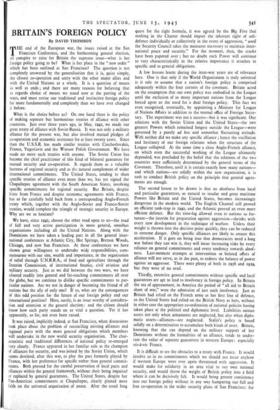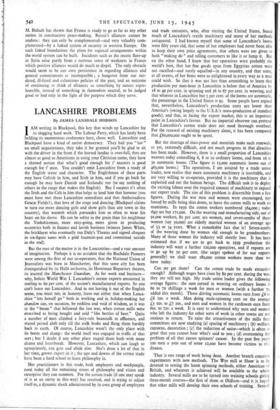BRITAIN'S FOREIGN POLICY
By DAVID THOMSON What is the choice before us? On one hand there is the policy' of making separate but harmonious treaties of alliance with other countries. Just over three years ago, in May, 1942, we made our great treaty of alliance with Soviet Russia. It was not only a military alliance for the present war, but also involved mutual pledges of co-operation and economic assistance for at least twenty years. Since then the U.S.S.R. has made similar treaties with Czechoslovakia, France, Yugoslavia and the Warsaw Polish Government. We have made no more such treaties with anyone. The Soviet Union has become the chief practitioner of this kind of bilateral guarantee for mutual security and co-operation. It regards them as a valuable buttress of regional security and as the natural complement of wider international commitments. The United States, tending to shun specific treaties of alliance even more than we, has yet signed the Chapultepec agreement with the South American States, involving specific commitments for regional security. But Britain, despite hints from France and despite economic agreements with France, has so far carefully held back from a corresponding Anglo-French treaty which, together with the Anglo-Soviet and Franco-Soviet treaties, would complete the triangle of strategic security in Europe. Why are we so hesitant?
We have, since 1942, chosen the other road open to us—the road of full and very active participation in more general, omnibus organisations including all the United Nations. Along with the Dominions we have taken a leading part in all the general inter- national conferences at Atlantic City, Hot Springs, Bretton Woods, Chicago, and now San Francisco. At these conferences we have shown great willingness to undertake wide responsibilities, com- mensurate with our size, wealth and importance, in the organisation of relief through U.N.R.R.A., of food and agriculture through the Interim Commission, of international finance, civil aviation and military security. Just as we did between the two wars, we have entered readily into general and far-reaching commitments all over the globe, but we continue to dislike specific commitments to par- ticular nations. Are we not in danger of becoming the friend of all nations but the ally of only one? If so, what are the consequences of this odd position for the future of our foreign policy and our international position? Here, surely, is an issue worthy of considera- tion and attention at the general election: and the citizen should know how each party stands on so vital a question. Yet it has apparently, so far, not even been raised.
It was raised, implicitly indeed, at San Francisco, when discussions took place about the problem of reconciling existing alliances and regional pacts with the more general obligations which members will undertake in the new world security organisation. The char- acteristic and traditional differences of national policy re-emerged very clearly. France appeared in her familiar role as the champion of alliances for security, and was joined by the Soviet Union, which seems destined, after this war, to play the part formerly played by France, with her preference for specific rather than general commit- ments. Both pressed for the careful preservation of local pacts and alliances within the general framework, without their being impaired or replaced by general guarantees. The United States, despite her Pan-American commitments at Chapultepec, clearly pinned most faith on the universal organisation of peace. After the usual long quest for the right formula, it was agreed by the Big Five that nothing in the Charter should impair the inherent right of self- defence individually or collectively in the event of aggression, "until the Security Council takes the measures necessary to maintain inter- national peace and security." For the moment, then, the cracks have been papered over ; but no doubt each Power will continue to vary characteristically in the relative importance it attaches to specific and to general obligations.
A few lessons learnt during the inter-war years are of relevance here. One is that only if the World Organisation is truly universal is it safe to assume that a nation's foreign policy is comprised adequately within the four corners of the covenant. Britain acted on the assumption that our own policy was embodied in the League until the exclusion of so many important nations from the League forced upon us the need for a dual foreign policy. This fact we even recognised, eventually, by appointing a Minister for League of Nations Affairs in addition to the normal office of Foreign Secre- tary. The experiment was not a success—but it was significant. Our relations with the Soviet Union and the United States—the two greatest Powers which remained longest outside the League—were governed by a purely ad hoc and somewhat fluctuating attitude. With neither did we make any specific alliance ; hence the vacillation and hesitancy of our foreign relations when the structure of the League collapsed. At the same time a close Anglo-French alliance, on which even the successful working of the League ultimately depended, was precluded by the belief that the relations of the two countries were sufficiently determined by the general terms of the Covenant. Therefore, until it is certain exactly how many nations— and which nations—are solidly within the new organisation, it is rash to conduct British policy on the principle that general agree- ments are enough. .
The second lesson to be drawn is that an aloofness from local and particular guarantees, so natural to insular and great maritime Powers like Britain and the United States, becomes increasingly dangerous in the modern world. The English Channel still proved an efficient tank-trap in 1940, and the Atlantic proved an even more efficient defence. But the time-lag allowed even to nations so for- tunate—the interim for preparation against aggression—shrinks with every new development in the technique of warfare. Unless their weight is thrown into the decisive point quickly, they can be reduced to extreme danger. .Only specific alliances are likely to ensure this acceleration. If it goes on being true that democracies need a long war before they can win it, they will incur increasing risks by every reliance on general commitments and every tendency towards aloof- ness. Last-moment attempts at intervention or belated offers of alliance will not serve, as in the past, to redress the balance of power against an aggressor. There were plenty of both in 1938 and 1939, but they were of no avail.
Thirdly, extensive general commitments without specific and local guarantees are apt to lead to insolvency in foreign policy. In Britain the era of appeasement, in America the period of "all aid to Britain short of war," were the admission of just such insolvency. Just as Britain had relied on the French army as her first line of defence, so the United States had relied on the British Navy as hers, without in either case the appropriate co-ordination of national policies having taken place at the political and diplomatic level. Liabilities outrun assets not only when armaments are neglected, but also when diplo- matic assets—alliances—are neglected. Stalin's policy is based solidly on a determination to accumulate both kinds of asset. Britain, knowing that she can depend on the military support of her Dominions without the formalities of an alliance, tends to under- rate the value of separate guarantees in western Europe: especially vis-a-vis France.
It is difficult to see the obstacles to a treaty with France. It would involve us in no commitments which we should not incur anyhow if western Europe were ever again threatened with aggression. It would make for solidarity in an area vital to our own national security, and would throw the weight of British policy into a field where it can be decisively felt. It would bring greater consistency into our foreign policy without in any way hampering our full and free co-operation in the wider security plans of San Francisco: for
M. Bidault has shown that France is ready to go as far as any other nation in constructive peace-making. Russia's alliances cannot be undone: they can only be complemented—and very valuably com- plemented—by a linked system of security in western Europe. On such linked foundations the plans for regional arrangements within the world system can be built. Incidents such as the recent flare-up in Syria arise partly from a nervous sense of weakness in France which positive alliances would do much to dispel. The only obstacle would seem to be our own persistence in regarding alliances and general commitments as incompatible ; a hangover from our out- dated, ill-fated and calamitous policies of the past, and an outcome of continuing to think of alliances as something by nature repre- hensible, instead of something in themselves neutral, to be judged good or bad only in the light of the purpose which they serve.



























 Previous page
Previous page